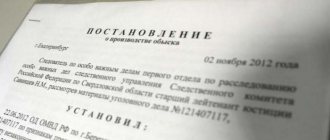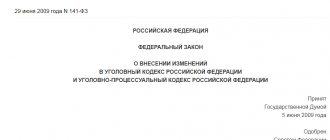1. The basis for conducting a search is the presence of sufficient data to believe that in any place or in the possession of any person there may be tools, equipment or other means of committing a crime, objects, documents and valuables that may be important for the criminal case.
2. The search is carried out on the basis of the investigator’s decision. 3. A search of a home is carried out on the basis of a court decision adopted in the manner established by Article 165 of this Code. 4. Before the search begins, the investigator presents a resolution on its conduct, and in the cases provided for in part three of this article, a court decision authorizing its conduct. 5. Before the search begins, the investigator offers to voluntarily hand over items, documents and valuables that may be important for the criminal case to be confiscated. If they were given out voluntarily and there is no reason to fear their concealment, then the investigator has the right not to conduct a search.
6. During a search, any premises may be opened if the owner refuses to open them voluntarily. In this case, unnecessary damage to property should not be allowed.
7. The investigator takes measures to ensure that the circumstances of the private life of the person whose premises were searched, his personal and (or) family secrets, as well as the circumstances of the private life of other persons, revealed during the search, are not disclosed.
8. The investigator has the right to prohibit persons present at the place where the search is being carried out from leaving it, as well as from communicating with each other or other persons until the end of the search.
9. During a search, in any case, objects and documents taken out of circulation are confiscated.
9.1. During a search, electronic media are confiscated with the participation of a specialist. At the request of the legal owner of the seized electronic storage media or the owner of the information contained on them, the specialist participating in the search, in the presence of witnesses, copies information from the seized electronic storage media. Copying of information is carried out onto other electronic media provided by the legal owner of the seized electronic media or the owner of the information contained on them. During a search, copying information is not allowed if this may interfere with the investigation of a crime or, according to a specialist, lead to the loss or change of information. Electronic storage media containing copied information are transferred to the legal owner of the seized electronic storage media or the owner of the information contained on them. An entry is made in the protocol regarding the copying of information and the transfer of electronic media containing the copied information to the legal owner of the seized electronic media or the owner of the information contained on them.
10. Seized items, documents and valuables are presented to witnesses and other persons present during the search, and, if necessary, are packaged and sealed at the search site, which is certified by the signatures of these persons.
11. When conducting a search, the person in whose premises the search is being carried out or adult members of his family participate. During the search, a defense attorney has the right to be present, as well as a lawyer for the person whose premises are being searched.
12. During a search, a protocol is drawn up in accordance with Articles 166 and 167 of this Code.
13. The protocol must indicate in what place and under what circumstances the objects, documents or valuables were discovered, whether they were handed over voluntarily or forcibly confiscated. All seized items, documents and valuables must be listed with an exact indication of their quantity, measure, weight, individual characteristics and, if possible, cost.
14. If during the search attempts were made to destroy or hide objects, documents or valuables to be confiscated, then a corresponding entry is made about this in the protocol and the measures taken are indicated.
15. A copy of the protocol is given to the person whose premises were searched, or to an adult member of his family. If the search was carried out on the premises of an organization, then a copy of the protocol is handed over to a representative of the administration of the relevant organization against signature.
16. A search may also be carried out in order to locate wanted persons and corpses.
Article 182 of the Code of Criminal Procedure of the Russian Federation. Grounds and procedure for conducting a search (current version)
5. Literal interpretation of Part 2 of Art. 29 and art. 182 of the Code of Criminal Procedure allows us to come to the incorrect, in our opinion, conclusion that only personal searches and searches in the home are carried out by court decision (Part 3 of Article 182), and all other types of searches, without exception, do not require additional sanctions. At the same time, procedural norms and guarantees must be considered taking into account their goals, and in such a way that their literal or even formal-logical interpretation does not lead to obvious contradictions (absurdity). Thus, one should take into account the fact that a search is carried out on less grounds and more seriously restricts the rights of citizens than a seizure. At the same time, some types of seizure require a court decision (seizure of objects and documents containing state or other secrets protected by federal law - clause 7, part 2, article 29, part 4, article 183). But in the same cases, if we proceed from the literal interpretation of the law, the search is carried out without any permission or consent, moreover, not on a reliable basis (as is required for a seizure), but only on a probable basis. Then special authorization of the seizure would lose all meaning. Indeed, why would an investigator justify in court evidence the need to seize bank documents if he could instead search a credit institution and seize them without any permission? This obvious contradiction provides the basis for a broad interpretation of the rules contained in paragraph 7 of part 2 of Art. 29 and part 4 of Art. 183 Code of Criminal Procedure. According to this interpretation, forced seizure (not only during seizure, but also during search) of objects and documents containing state or other secrets protected by federal law, including bank secrecy, requires, in our opinion, judicial authorization. This interpretation was confirmed by the Constitutional Court of the Russian Federation in Definitions of January 19, 2005 No. 10-O, of May 29, 2007 No. 427-O-O. It should be noted that a number of federal laws provide for the need to obtain a court decision to conduct certain types of searches. These laws have priority over the Code of Criminal Procedure, since they are specifically designed to regulate separate groups of social relations. The Constitutional Court of the Russian Federation consistently points out the inadmissibility of conducting a search without judicial permission: a) in relation to a lawyer, including in residential and office premises used for legal practice (Definition of the Constitutional Court of the Russian Federation of November 8, 2005 N 439-O; part 3 Article 8 of the Federal Law of May 31, 2002 N 63-FZ “On advocacy and the legal profession in the Russian Federation”); b) in relation to items and documents containing audit secrets (Definition of the Constitutional Court of the Russian Federation of March 2, 2006 N 54-O; Article 8 of the Federal Law of August 7, 2001 N 119-FZ “On Auditing Activities”).
6. Voluntary release of an item before the start of search operations has the legal significance of an evidentiary fact: a) active repentance (as a basis for termination of the case under Article 28 of the Code of Criminal Procedure as a mitigating circumstance), if the person who issued the item could still have disposed of it differently (destroy the drugs); b) refuting the version of the planting of the object during the search; c) confirming conscious possession of this item. According to the notes to Art. Art. 222 and 228 of the Criminal Code of the Russian Federation (as amended on December 8, 2003) does not recognize the voluntary surrender of drugs or weapons during a search and, therefore, does not exempt from criminal liability. However, it should be taken into account that voluntary surrender may begin before the search and lead to release from criminal liability, regardless of the method of actual seizure of weapons or drugs. For example, a citizen tells the police by phone about his desire to voluntarily surrender his weapon, which is then confiscated during a search. Judicial practice establishes the obligation of investigative bodies to provide the opportunity to the accused (suspect) to voluntarily give up weapons or drugs so that he can take advantage of the provisions of the criminal law, according to which the person who voluntarily gives up weapons is exempt from criminal liability;
———————————
See: paragraph 19 of the Russian Federation PPVS dated June 15, 2006, No. 14 “On judicial practice in cases of crimes related to narcotic drugs, psychotropic, potent and toxic substances.”
See: Resolution of the Presidium of the RF Armed Forces of March 26, 2003 N 969p02.
7. During a search, items that are completely prohibited for circulation (withdrawn from circulation) are additionally confiscated - Part 2 of Art. 129 of the Civil Code, and things whose circulation is limited may also be confiscated (Part 2 of Article 129 of the Civil Code). These items are confiscated without proper permission to possess them.
8. A feature of the search is the requirement to ensure the mandatory participation in it of the person in whose premises the search is being carried out, or adult members of his family. According to the meaning of the Code of Criminal Procedure, the owner of the object being searched (and not just the premises), or his representative (analogous to Part 6 of Article 177 and Part 15 of the Commentary Article), or persons living in the dwelling are invited to participate in the search. Failure to comply with this requirement, if there is an opportunity to fulfill it, is a significant violation of the procedural law (Part 3 of Article 7) and entails the inadmissibility of the evidence obtained. In emergency situations, owner participation cannot be ensured. The Code (Part 6 of Article 177 of the Criminal Procedure Code) only provides for a record of this in the protocol. More successful was a similar norm of the Code of Criminal Procedure of the RSFSR (Part 2 of Article 169 of the Code of Criminal Procedure), which allows for the invitation of a representative of a housing maintenance organization or local government. It seems that at the level of recommendations it is advisable to use it at the present time. The investigator does not have the right to refuse the presence of a defense attorney (Clause 5, Part 1, Article 53 of the Code of Criminal Procedure) or the lawyer of the owner of the object being searched during the search. Moreover, to ensure the admissibility of the search results, it is advisable for the investigator to involve a defense attorney or lawyer in the case. In this case, the requirements for the surprise of the search may well be met (the defense attorney is invited to the investigator’s office at a certain time to participate in some investigative actions, only after the search begins he only learns that this is a search). Taking into account the official interpretation of the Constitution of the Russian Federation, given in Resolution of the Constitutional Court of the Russian Federation of June 27, 2000 N 11-P in the Maslov case, a person in respect of whom a search is carried out with the aim of convicting him of committing a crime has the right to protection, since he is in the position of a suspect in the constitutional sense of the word. Therefore, his lawyer must have all the rights of a defense attorney.
———————————
See: Resolution of the Presidium of the RF Armed Forces N 969p02 in the Protasov case.
9. If damage to property during a search raised doubts about the reliability of the evidence obtained or was a means of illegally influencing the suspect or accused (compelling him to testify under the threat of damaging property), then it entails the inadmissibility of the evidence obtained.
10. A special guarantee of respect for the rights and legitimate interests of citizens during a search is the possibility of appealing the decision to conduct a search and its results directly to the court, which was directly noted by Resolution of the Constitutional Court of the Russian Federation of March 23, 1999 No. 5-P. See comment about this. to Art. Art. 125, 165.
Comments from jurists and jurists
A search is an action that is regulated by criminal procedural legislation and ensured by coercion from the state. It consists of studying a home and other premises, objects on the ground and people in order to identify and seize documents, objects, valuables and even sometimes corpses there, which can influence the consideration of criminal cases by confirming the ownership of these objects to a certain person. These actions can help apprehend the criminal or free the victim.
A search as a criminal legal category is a search for documents, objects or valuables that are suspected of being involved in criminal activity. The search for the right things can be carried out in a certain place or in relation to certain people. The Code of Criminal Procedure of the Russian Federation clearly defines the concept and essence of a personal search. In contrast, personal searches are not regulated by the Code of Criminal Procedure. Its features are reflected in the Code of Administrative Offenses of the Russian Federation. In addition, a transport search and the seizure of things discovered during the search, regulated by the administrative code, differ from a personal search.
In order to inspect a place and search it, according to the latest edition, two facts must be present:
- a person who legally owns property may have objects that are relevant to the resolution of a criminal case;
- there is a possible danger that these objects will be hidden or destroyed.
Work can be done both during the day and at night.
Differences in actions of a criminal procedural nature are often discussed in theses and reports of legal scholars. The relationship between the characteristics of various types of criminal procedural actions is clearly delineated in the comments of legal experts.
A personal search of the Criminal Procedure Code of the Russian Federation differs from other actions of a criminal procedural nature (for example, examination, interrogation, arrest) in that it can be carried out exclusively at the stage of preliminary investigation. This is regulated by Art. 184 Code of Criminal Procedure of the Russian Federation. It is not permitted by the legislation of the Russian Federation to conduct a search of the accused at the stage of initiating a criminal case or during the trial.
The compulsory inspection is explained by the fact that there is a real danger that documents and items subject to seizure may be hidden. This is the main difference between a search and an inspection or voluntary surrender of property. In addition, as a result of the search, the location of documents, objects, valuables or even corpses is established, as well as traces of the crime committed.
The purpose of the search and inspection is to detect, seize the search object and record the entire process. But unlike an inspection, a search establishes the location of the things themselves or even the corpses. Also, as a result of the search, the location of living people can be established. During the search, the entire surrounding picture is recorded in order to establish the circumstances of the location, method of storage and the process of confiscation of things.
The search is carried out only in a specific place owned by a specific person (home or location of an organization, government agency, etc.), and the inspection can be carried out even on the street or in abandoned buildings. If the employees conducting the search do not have reliable information that the building is the property of the person being searched, it is considered that ownership is confirmed in absentia.
When an investigator receives information about the possible location of search objects, it must be supported by evidence. Unsubstantiated data can be accepted regarding the location of the object. In order to identify the subject of the search, real evidence is needed.
Search according to Art. 182 of the Code of Criminal Procedure of the Russian Federation, in contrast to seizure, is based on approximate data about what and where to look. If there is reliable information about the item and its location, the item is seized. It can be held at any time of the day.
If a person voluntarily gave up an item before search efforts began to seize it, this will be counted as an evidentiary fact and will have an impact on the future course of the case, namely:
- This will be counted as confirmation of active repentance and will be considered a mitigating circumstance when making a court decision if the guilty person had the opportunity to destroy the thing or dispose of it in his own way.
- It will be impossible for the defense to put forward a version that the item was planted during the search.
- The guilty person possessed the thing knowingly.
According to the comments and notes to the articles of the Criminal Code on drugs, if a weapon or narcotic substances were found during a search, their transfer to investigators is not a voluntary surrender, therefore the person is subject to full criminal liability. Moreover, if the search has not yet begun, and the guilty person has already reported the presence of prohibited items (for example, by telephone), exemption from liability is possible in some cases. In addition, the court also obliges investigators to provide the accused with the opportunity to hand over the required items voluntarily in order to mitigate the punishment or be released from liability.
When conducting a search, police officers seize the items they are looking for, as well as items that are withdrawn from circulation or are in restricted circulation (if there is no permission to use them).
With regard to the requirement to conduct a search solely in the presence of the property owner, his consultant or representative (at the request of the person), adult relatives or household members, it should be noted that there are cases when no one is on the property. The search in this case is illegal, and the seized items will not serve as evidence. The legislation regulating criminal proceedings does not regulate the procedure in such situations, with the exception of the obligation to enter this fact into the search protocol. Earlier procedural legislation provided in this case the possibility of involving a house management or local government employee as a representative of the owner's side.
If a person suspected of committing a crime and possessing the required items has not declared the right to have a representative present, the investigator has the right to invite the suspect’s lawyer or a public defender. This is also possible when conducting a personal search in the investigator’s office.
When a seized item was damaged during the search, and this cast doubt on the reliability of the item as evidence, such evidence is considered inadmissible. The same applies to obtaining information in the event of unlawful influence (including threats) on a suspect.
As a guarantor of respect for the rights of the suspect and his interests during a search, the right to appeal in court a preliminary decision to order a search or to appeal the results of the inspection is used.
Criminal Procedure Code of the Russian Federation:
Article 182. Grounds and procedure for conducting a search
1. The basis for conducting a search is the presence of sufficient data to believe that in any place or in the possession of any person there may be tools, equipment or other means of committing a crime, objects, documents and valuables that may be important for the criminal case.
2. The search is carried out on the basis of the investigator’s decision.
3. A search of a home is carried out on the basis of a court decision adopted in the manner established by Article 165 of this Code.
4. Before the search begins, the investigator presents a resolution on its conduct, and in the cases provided for in part three of this article, a court decision authorizing its conduct.
5. Before the search begins, the investigator offers to voluntarily hand over items, documents and valuables that may be important for the criminal case to be confiscated. If they were given out voluntarily and there is no reason to fear their concealment, then the investigator has the right not to conduct a search.
6. During a search, any premises may be opened if the owner refuses to open them voluntarily. In this case, unnecessary damage to property should not be allowed.
7. The investigator takes measures to ensure that the circumstances of the private life of the person whose premises were searched, his personal and (or) family secrets, as well as the circumstances of the private life of other persons, revealed during the search, are not disclosed.
8. The investigator has the right to prohibit persons present at the place where the search is being carried out from leaving it, as well as from communicating with each other or other persons until the end of the search.
9. During a search, in any case, objects and documents taken out of circulation are confiscated.
9.1. Lost power. — Federal Law of December 27, 2018 N 533-FZ.
10. Seized items, documents and valuables are presented to witnesses and other persons present during the search, and, if necessary, are packaged and sealed at the search site, which is certified by the signatures of these persons.
11. When conducting a search, the person in whose premises the search is being carried out or adult members of his family participate. During the search, a defense attorney has the right to be present, as well as a lawyer for the person whose premises are being searched.
12. During a search, a protocol is drawn up in accordance with Articles 166 and 167 of this Code.
13. The protocol must indicate in what place and under what circumstances the objects, documents or valuables were discovered, whether they were handed over voluntarily or forcibly confiscated. All seized items, documents and valuables must be listed with an exact indication of their quantity, measure, weight, individual characteristics and, if possible, cost.
14. If during the search attempts were made to destroy or hide objects, documents or valuables to be confiscated, then a corresponding entry is made about this in the protocol and the measures taken are indicated.
15. A copy of the protocol is given to the person whose premises were searched, or to an adult member of his family. If the search was carried out on the premises of an organization, then a copy of the protocol is handed over to a representative of the administration of the relevant organization against signature.
16. A search may also be carried out in order to locate wanted persons and corpses.
Return to the table of contents of the document: Criminal Procedure Code of the Russian Federation in the current edition





